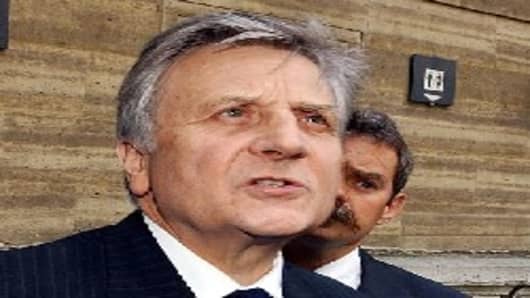The current levels of budget deficits in both Europe and the U.S. are not sustainable and Europe's economic recovery will only be modest, European Central Bank President Jean-Claude Trichet told CNBC Thursday.
"We all have a very, very big challenge... The levels of public finance deficit are non-sustainable on both sides of the Atlantic, that's absolutely clear," Trichet said.
"Now we are in a stage of recovery … I expect, but I'm very cautious and prudent, modest recovery (is) coming. Of course the future is not written yet, it depends on us," said Trichet.
Confidence is vital to the recovery and without it the money spent on trying to stimulate the economy would be wasted, Trichet said. And sticking to the rules of the European Stability and Growth Pact, which states members have to keep their deficits below 3 percent of gross domestic product, is essential, Trichet went on to say.
"We have to reinforce the confidence of our own people … in our capacity to go back to a sustainable position," the ECB president said.
Trichet added that the global economy has avoided the immediate threat of an outright depression thanks to the prompt and bold actions of central banks in Europe, the U.S. and Britain.
Greek Path
To help Greece deal with its debt ridden economy, Trichet said the ECB has approved Greece's plan to reduce its deficit to below 3 percent of gross domestic product in 2012, in line with the stability and growth pact.
"I think that this will be implemented and it calls of course for the appropriate decisions to meet the goal," said Trichet.
- Watch the first part of Jean-Claude Trichet's interview above and the second part here >>>
A number of other euro zone counties have set out a series of steps to reach the goal of being below the 3 percent target, according to Trichet. If all of the euro zone's deficits were consolidated it would come out around 6 percent of GDP, Trichet said citing figures from the International Monetary Fund. A number that is less than other industrialized countries, Trichet pointed out.
Meanwhile, Greek Prime Minister George Papandreou told CNBC Thursday that Greece was "absolutely determined to implement the plan," but admitted it would be "painful" to make the budget cuts.
"I'm upbeat that Greece is determined to make the changes necessary to bring back the credibility, but also to bring down the deficit and bring growth to our country. We have great potential," Papandreou said.
- Watch the full interview with George Papandreou here >>>
Investors continued to fret about the outlook of Greece's budget deficit Thursday, pushing the euro lower against the dollar and yields on Greek bonds higher.




